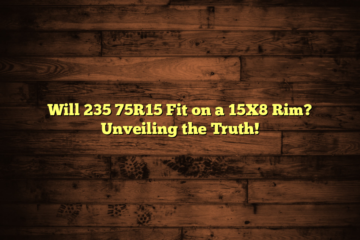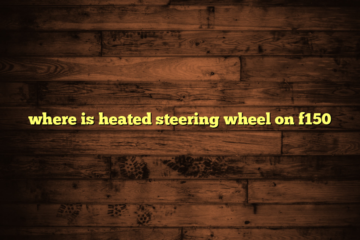What Wheels Fit Chevy Colorado?
Choosing the right wheels for your Chevy Colorado is essential for both its performance and appearance. The key factors to consider include the bolt pattern, wheel size, and offset. Most Chevy Colorado models have a bolt pattern of 6x120mm, but it’s crucial to verify this information for your specific vehicle model and year.
Introduction
When it comes to customizing or replacing the wheels on a Chevy Colorado, the right fit is crucial for ensuring the vehicle’s optimal performance and safety. Wheels that properly fit contribute not only to the truck’s aesthetic appeal but also to its handling, fuel efficiency, and overall driving experience. In this blog post, we delve deep into the aspects of wheel compatibility for the Chevy Colorado, exploring everything from bolt patterns and rim sizes to offset considerations and tire compatibility.
The Chevy Colorado, a popular mid-size truck known for its versatility and durability, has specific requirements when it comes to wheel fittings. Ensuring you have the correct wheel specifications can enhance your truck’s performance and prevent potential mechanical issues. This guide aims to provide comprehensive information to help Chevy Colorado owners make informed decisions about wheel replacements or upgrades.
Key Takeaways
- Bolt Pattern: The most common bolt pattern for Chevy Colorado is 6x120mm, crucial for wheel compatibility.
- Wheel Size: Sizes can vary widely, with common options ranging from 16 to 18 inches in diameter.
- Offset: Proper wheel offset ensures that the wheels align correctly with the vehicle’s suspension and bodywork.
- Tire Compatibility: The wheel dimensions must support the tire sizes recommended for Chevy Colorado to maintain performance and safety.
- Durability and Materials: Choosing wheels made from durable materials like alloy or forged aluminum can impact the truck’s performance and longevity.
- Aesthetics: The right wheels can significantly enhance the visual appeal of your Chevy Colorado.
Understanding Bolt Patterns
The bolt pattern is arguably the most critical factor in wheel compatibility. For the Chevy Colorado, the typical bolt pattern is 6x120mm. However, this can vary based on the year and specific model of your truck. It’s essential to confirm this detail to ensure a perfect fit.
Measuring Bolt Patterns
Understanding how to measure the bolt pattern on your vehicle is key if you’re considering aftermarket wheels. For a 6-lug pattern like the Chevy Colorado’s, you’ll measure from the center of one bolt to the outer edge of the bolt directly across from it.
Wheel Size and Dimensions
Wheel size affects not only the look of your Chevy Colorado but also its handling and ride quality. Common sizes range from 16 to 18 inches, with variations in width also playing a role in fitment.
Impact on Performance
The size of your wheels can influence the truck’s performance, including acceleration, braking, and handling. Larger wheels may offer a more aggressive look and improved handling, but they can also lead to a stiffer ride.
Wheel Offset and Why It Matters
Offset is the distance from the centerline of the wheel to its mounting surface. The right offset ensures that the wheels and tires have enough clearance with the bodywork and suspension components, preventing rubbing and other issues.
Positive vs. Negative Offset
A positive offset means the mounting surface is closer to the wheel’s front, while a negative offset indicates it’s closer to the back. The Chevy Colorado typically requires a specific offset range to maintain proper alignment and handling.
Tire Compatibility and Considerations
Choosing the right tires to go with your wheels is just as important. The tires should match the recommended size for your Chevy Colorado to ensure safety, performance, and fuel efficiency.
Importance of Tire Size
The right tire size ensures that your vehicle’s speedometer, odometer, and traction systems function correctly. It also affects the vehicle’s handling and comfort.
Material and Construction
Wheels can be made from various materials, each offering different benefits in terms of weight, durability, and cost. Alloy wheels are a popular choice for their balance of strength and lightweight.
Alloy vs. Steel Wheels
Alloy wheels, typically made from aluminum or magnesium, offer a good blend of lightness and strength, improving handling and fuel economy. Steel wheels are more durable and cheaper but heavier, potentially reducing performance.
Aesthetic Considerations
The design and finish of your wheels can dramatically change the appearance of your Chevy Colorado. From sleek and modern to rugged and traditional, there’s a wide range of styles to choose from.
Customization Options
Beyond the basic design, wheel customization can include color, finish, and even custom wheel covers or caps, allowing Chevy Colorado owners to personalize their vehicles to their tastes.
Conclusion
Selecting the right wheels for your Chevy Colorado involves more than just finding a design you like. It requires understanding the specific technical requirements of your vehicle, including bolt patterns, wheel sizes, offsets, and tire compatibility. By considering these factors, you can enhance both the performance and appearance of your Chevy Colorado, ensuring a safe and enjoyable driving experience.
FAQ
Can I fit larger wheels on my Chevy Colorado?
Yes, but it’s essential to ensure they don’t affect the suspension, steering, or bodywork due to changes in size and offset.
How do I know if a wheel’s offset is compatible with my Colorado?
Check the manufacturer’s specifications for your truck or consult with a wheel specialist to ensure proper fitment.
Can changing my wheels affect my vehicle’s warranty?
It can, especially if the modifications lead to damage. Always check your warranty terms and consult with a professional.
Is it better to choose alloy or steel wheels?
Alloy wheels are generally better for performance and aesthetics, while steel wheels may be preferable for durability and cost.
How often should I check my wheel fitment?
It’s wise to check whenever you change tires, encounter suspension issues, or after any modifications to your vehicle.
Can wheel size impact fuel efficiency?
Yes, larger wheels can increase rolling resistance and weight, potentially reducing fuel efficiency.




